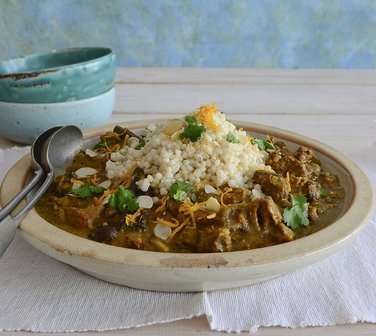Book turns up heat on change
Top chefs and foodies have joined forces for a new cookbook to support Earth Hour — the world’s biggest grassroots environmental movement started by World Wildlife Fund- Australia eight years ago.
Planet to Plate, launched last month to spread the word about how rising temperatures and extreme weather are affecting the produce we take for granted, is already on its second print run and celebrates everything we love to eat, from apples and potatoes to cauliflower, carrots, oranges, beef, scallops and lamb.
Take apples. An extra 10 minutes of extreme sunlight can burn fruit and very hot conditions during maturation between January and April can lower quality and yield. Or potatoes. High temperatures and humidity can cause “late blight” which rots tubers and makes them inedible.
Cauliflower is susceptible to “clubroot” as soil temperatures rise. Carrots also prefer cooler weather, with a tight 15-18C optimal temperature range, which may make production less viable in warmer areas. Even honey is at risk of losing flavour and texture because bees gather water instead of nectar on sweltering days to keep their colonies cool.
“Almost every chef we contacted said yes, except for the few who had their own cookbooks in the chain, ” WWF-Australia’s Rachael Bruzzese said. “Many attended briefings in Sydney and Melbourne, which is pretty amazing for busy people. To spare half a day in the boardroom talking all things climate change is a big ask but they are passionate about the issue as they all have close ties to farmers.”
More than 30 came on board, including the grand dame of Australian cooking, Margaret Fulton, with her French apple tart; MasterChef co-host Matt Preston with the world’s simplest bread; Billy Kwong’s Kylie Kwong with crispy soy-roasted pork belly; and Rockpool’s Neil Perry with Spanish-style chicken casserole.
“Everything in this book underpins our philosophy at the Rockpool Group, ” Perry said. “Our relationships with farmers, fishermen and producers are the cornerstone of what we do. Sustainability is a given but it’s also about reducing waste and being conscious of our footprint. It’s pretty clear that climate change is happening around the world, but even if you want to be a sceptic there’s nothing to lose by leaving the planet a cleaner, better place.”
Recipes, for the most part, are straightforward, beautifully photographed and tie into the narrative about global warming. Sources for all background information are meticulously listed and a Table Talk section at the back gives an overview of Australia’s climatic regions, with comments from farmers on the front line of changing weather patterns. They speak with a unanimous voice.
“Global warming is already affecting produce we enjoy in our lives, including fresh vegetables, cereals, bread and fruit, ” Earth Hour Australia’s Anna Rose said. “Our farmers are the custodians of the nation’s food bowl and need our support to minimise the harm carbon pollution is having on the supply of fresh food that we are so lucky to enjoy in Australia.”
More than 50 have their say, including Doodlakine stalwart Mike McFarlane, who’s been on the land for 58 years and third-generation Pingelly grain and sheep farmer Andrew Pauley. The latter still lives in the same farmhouse he grew up in. Looking back, he remembers wet winters and dry, hot summers.
“When I was growing up, we were definitely having a lot of wetter years and farming was easier in a way, ” he writes. “Within 10 years of taking on the farm, I could see subtle land changes with things such as weed pressure and soil structure depletion . . . Now, we seem to be getting tropical summers and mild winters. We’re getting less winter rainfall and more summer rainfall. We only have the one growing season here, in the winter and that can be very short.”
He’s moved with the times, planting barley and more oats because oats are more resilient and have the added benefit of putting carbon back into the soil as part of his integrated approach that’s ballooned into a business, Natural Farming Systems, to advise Wheatbelt farmers who are in the same boat.
“We’ve had to adapt with new fertilising regimes and technology to reduce the risk of changing weather patterns by building up our soil health because that’s the basis of everything we do, ” he said. “In the past 20 years, we’ve had some of our driest winters, so we’ve had to change tack — and Dad is right behind me.”
 Andrew Pauley. Picture: Holly Bassett.
Andrew Pauley. Picture: Holly Bassett.
Planet to Plate: The Earth Hour Cookbook (hardback) is published by WWF-Australia and available from earthhour.org.au/cookbook for $49.99 including postage. Proceeds from the sale of the book will go to supporting Earth Hour’s work with schools, small business and community groups.
Info Box
Earth Hour, a World Wildlife Fund-Australia initiative, started as a lights-out event in Sydney in 2007 to draw attention to global warming and has grown to take in 162 countries and 7000 cities worldwide. It’s held annually on the last Saturday in March, with individuals, communities, households and businesses encouraged to turn off their non-essential lights for one hour, from 8.30-9.30pm. Various countries use it to target specific environmental issues as they move to “going beyond the hour” with initiatives such as protecting the Amazon in Colombia and conserving the endangered Amur leopard in Russia.
© The West Australian
More Lifestyle and food news: thewest.com/lifestyle/food









